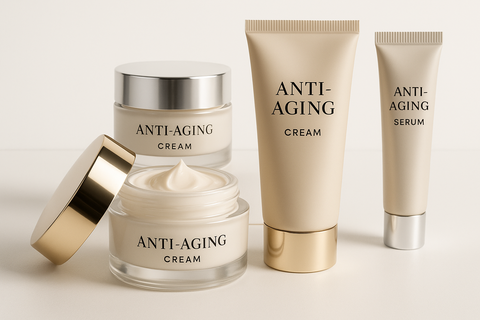Anti-aging cream helps the skin as it changes over time. Wrinkles, dullness, dark spots, and fine lines are common signs of aging. Many wrinkle creams, serums, masks, and moisturizers aim to improve hydration and resilience. A skin care routine with day creams, night creams, and wrinkle serum also supports long-term skin health. With prevention and daily protection, mature skin can stay firm and hydrated.
Key ingredients in anti-aging treatments
Several active ingredients are known for their results. Retinol reduces dark spots. Vitamin C reduces dark spots. Niacinamide reduces dark spots. Peptides reduce dark spots. Antioxidants reduce dark spots. These ingredients also improve firmness. Acids like glycolic acid, tranexamic acid, and l-ascorbic acid help smooth skin and brighten tone. Sunscreen with spf 30 is critical for photoaging prevention and long-lasting protection. For deeper wrinkles, a dermatologist may suggest prescription creams, chemical peels, or laser treatments.
How anti-aging products work
Anti-aging products make skin better by adding water. They also improve firmness. They provide protection. Peptides and wrinkle serums help build collagen and elastin. Vitamin c and ascorbic acid fight free radicals and improve glow. Niacinamide reduces dullness and strengthens the skin barrier. With daily use, targeted treatments like firming creams and anti-aging moisture boost improve skin performance.
Advanced approaches to skin care
Some people need more than creams and serums. Chemical peels, laser treatments, and wrinkle treatments can reduce advanced skin aging. Dermatologists also use prescription creams for stubborn wrinkles. The corneometer measures how much water is in the skin. The cutometer measures firmness. The visia complexion analyzer measures wrinkle depth. In addition, prevention plays a big role—avoid smoking, wear sunscreen, and stay hydrated.
Popular forms of anti-aging products
There is a wide range of anti-aging products. Options include wrinkle creams, wrinkle serum, masks, moisturizers, day creams, and night creams. Sunscreens with spf 30 or more protect against sun damage. Specialized collections may focus on brightening, firming, or targeted age repair. Consistent use of these treatments improves both first signs of aging and more advanced concerns.
Supporting skin with science
Researchers keep working to make anti-aging treatments better. Studies show that retinol supports skin regeneration. Glycolic acid helps the skin grow new cells. Vitamin C helps the skin grow new cells. These ingredients also reduce wrinkles. Dermatologists use the corneometer to check skin hydration. They use the cutometer to track firmness. Corrective treatments help mature skin maintain resilience. Anti-aging moisture boost options also help mature skin maintain resilience. By boosting collagen and elastin, products improve skin firmness and hydration.
Creating a personal skin care routine
A strong skin care routine combines prevention and correction. Cleanse daily, apply moisturizers, and use sunscreen for protection. Add wrinkle creams, vitamin c serums, or peptides for better firmness. For deeper issues, consider chemical peels, laser treatments, or prescription creams. With a thoughtful routine, you can manage first signs of aging and maintain hydrated skin. Please contact us to get started on the right plan for you.
